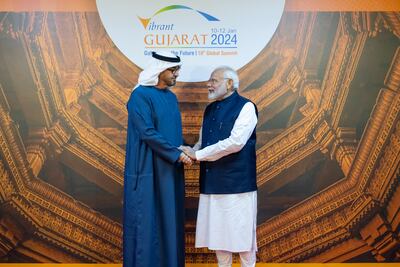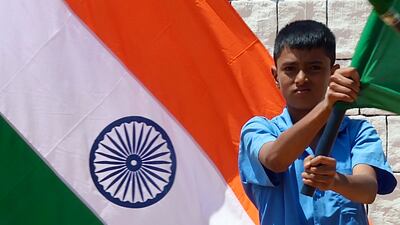Today, India and Indians around the world are celebrating 78 years of independence. Free from the shackles of colonial rule, India, that is Bharat, emerged like a phoenix rising from the ashes of a tumultuous past.
One could look back at India’s millennia-old history and lament the years lost under British rule, but the leaders and people of a free India set their eyes on the future. From Mahatma Gandhi’s aspirational goal of wiping every tear from every eye, to being a country that the world looks to for leadership, India’s journey has been nothing short of extraordinary.
Today, it stands as the world’s third-largest economy in purchasing power parity terms, and is on track to become the fourth largest in nominal terms by the end of the 2025 financial year. For more than a decade now, India has been among the top three fastest-growing major economies. As of May, the Indian startup ecosystem, ranked third globally in terms of unicorn count, is collectively valued at close to $350 billion.

Leading the charge in the fintech revolution, India accounted for an astounding 46 per cent of global digital transactions in March with close to 90 per cent of Indians integrated into the formal banking system. Furthermore, India’s telecommunications landscape now ranks as the second-largest globally, with close to 1.2 billion mobile users and close to 625 million Indians connected to the internet by early 2024.
From earlier years of famine and hunger, India has risen to become the world’s largest producer of milk, pulses and jute, and the second-largest producer of rice, wheat, sugarcane, groundnut, vegetables, fruits and cotton. The benefits of India’s economic growth have percolated downwards as is evident from the fact that India has lifted more than 800 million people out of extreme poverty.
With its firm belief in Vasudhaiva Kutumbakam – a Sanskrit phrase meaning “the world is one family”, India has tirelessly endeavoured to make the planet a better place for all humanity. As testament to this, despite the challenges of being a developing country, India achieved its nationally determined contributions on climate change well ahead of time, and have gone on to set new emissions targets.
During the Covid-19 pandemic, India demonstrated its commitment to global solidarity through Operation Vaccine Maitri, selflessly supplying domestically produced vaccines to about 150 countries in need. India has also been at the forefront of humanitarian assistance and disaster relief operations, whether it be lending a helping hand after earthquakes in Turkey or assisting international vessels to navigate Indian Ocean shipping lines safely.
In the past year, India has made remarkable strides in technology and space exploration. Chandrayan-3 became the first lander-rover mission to successfully touch down near the Moon’s south pole and earlier this month, Group Captain Shubhanshu Shukla of the Indian Air Force became the first Indian astronaut to be selected to fly a spacecraft to the International Space Station as part of the Axiom-4 mission. India now has its own space-based solar observatory mission – Aditya-L1 – which is collecting and relaying significant data to agencies worldwide. Moreover, India’s navigational satellite system, NaVIC, is offering greater accuracy than GPS in its coverage area.
Amid a world rife with turmoil, India has emerged as a voice of reason and conciliation. As president of the G20, along with its members and guest countries, India fostered consensus for a historic New Delhi Declaration in September. One of the many achievements of India’s Presidency was the inclusion of the African Union as a full member of the grouping, an example of India’s commitment to giving a voice to all at the table. India also championed the Voice of the Global South Summit, uniting countries from the Global South. India is also committed to its enduring belief in being a Vishwabandhu – a “friend of all”, and its international engagements reflect this commitment.
The India-UAE story is like no other. The Comprehensive Strategic Partnership between our countries transcends a mere economic agreement to one that embodies mutual trust and respect. It reflects an appreciation of our shared history and paves the way for a shared future. Our leaders, Prime Minister Narendra Modi and President Sheikh Mohamed, have been gradually laying the building blocks for this shared future, piece by piece and with great care.
The significance of this partnership is undeniable. Underlining this is the fact that since July last year, Mr Modi has visited the UAE three times and Sheikh Mohamed has visited India twice. The UAE was a special guest of India during India’s presidency of the G20, and India stood steadfast with the Emirates when it held the Cop28 presidency. The stature of our countries has been growing on the world stage as is evident from both being special invitees at the G7 summit in Italy earlier this year. Together, India and the UAE are leading pivotal initiatives, such as the India-Middle East-Europe Economic Corridor, and are committed to establishing resilient supply chains and reliable shipping networks amid geopolitical uncertainties.
At the bilateral level, India and the UAE are closer than ever before. Our financial systems are well on their way to close integration with the launch of the United Payments Interface in the UAE and the Rupee-Dirham Local Currency Trade Settlement Mechanism. Harnessing our strengths, India’s RuPay Card stack now forms the backbone of the UAE’s very own Jaywan domestic card scheme.
Moreover, the benefits of the India-UAE Comprehensive Economic Partnership Agreement are already apparent in the form of surging bilateral trade. Remarkably, the Emirates is the only country with which India has an active Cepa and a Bilateral Investment Treaty – a special relationship indeed.
India and the UAE have also embarked on an ambitious journey to build a future-ready populations. The Indian Institute of Technology Delhi’s Abu Dhabi campus is testament to that commitment. Its master’s programme began earlier this year and its flagship bachelor’s programme is to commence in September. The institute is on its way to attracting the best minds and moulding them into top professionals, entrepreneurs and researchers. Building on these foundations, our shared ambition to make the UAE a global hub for excellence in higher education is becoming a reality with another world-class institution set to commence operations in Dubai, that is, the Indian Institute of Management, Ahmedabad.
The friendship between India and the UAE stands as a global model, exemplifying the power of shared values and mutual respect. A shining example is the BAPS Hindu Mandir in Abu Dhabi, inaugurated by Mr Modi in February. This temple is not just a place of worship – it symbolises the strong values of tolerance and co-operation upheld by both nations.


